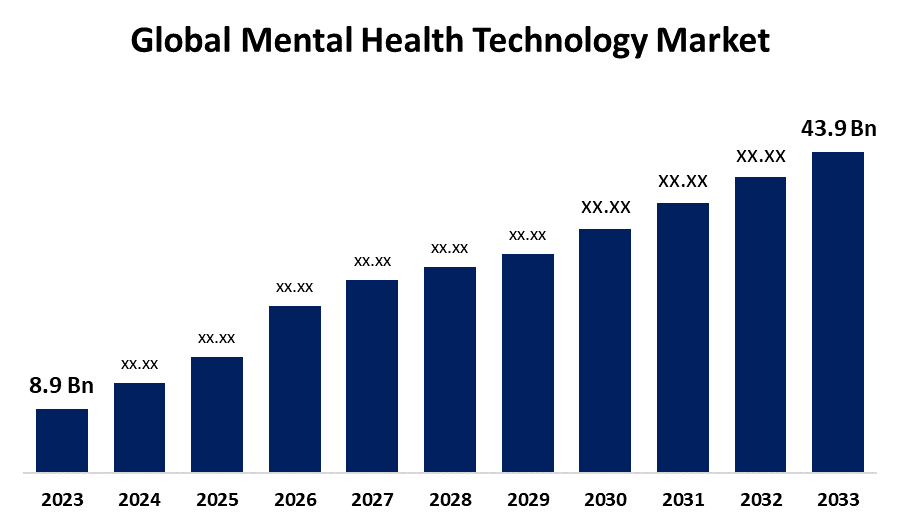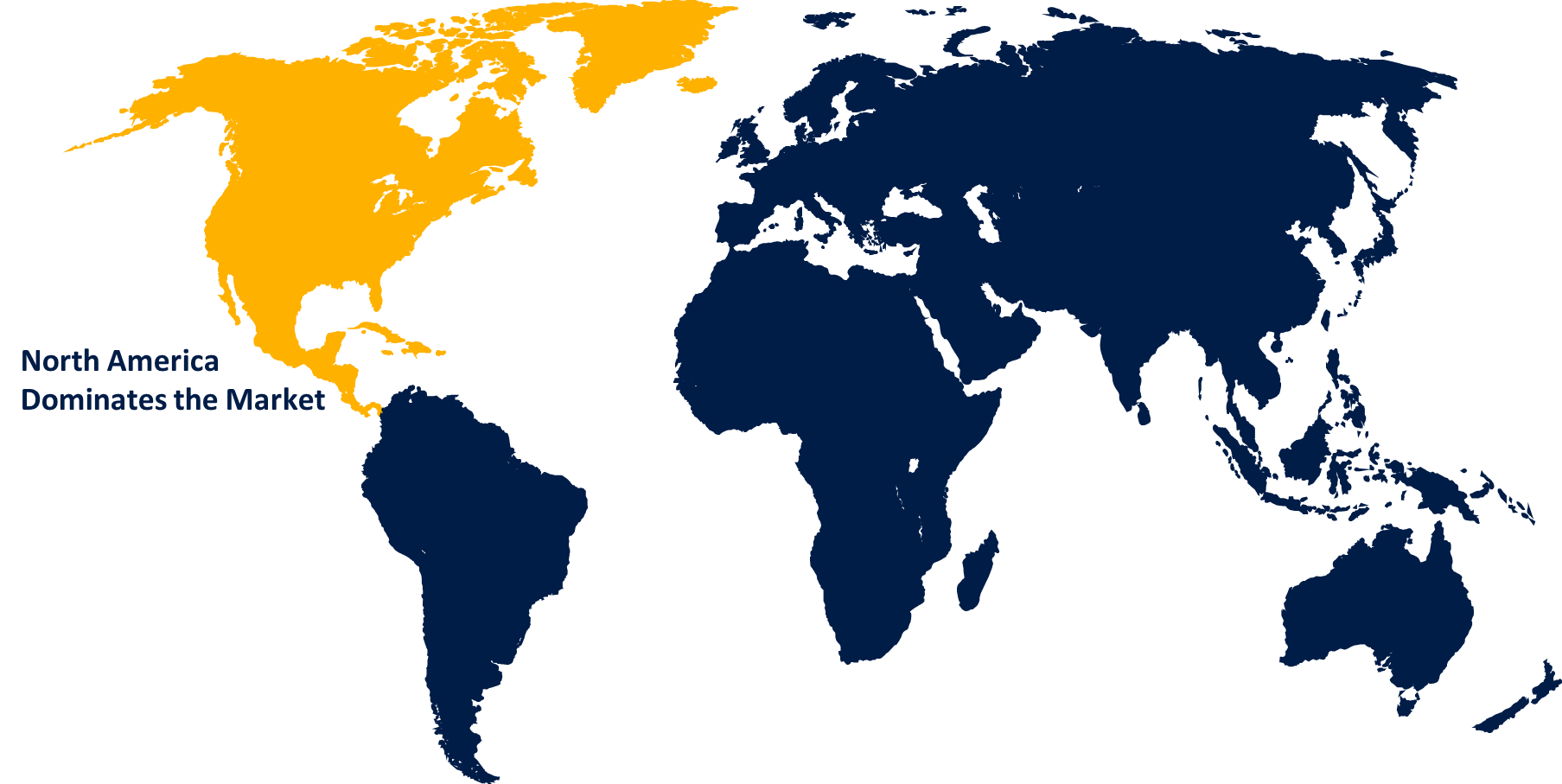Global Mental Health Technology Market Size, Share, and COVID-19 Impact Analysis, By Functionality (Clinical, Financial, and Administrative), By End-user (Providers, Payers, and Patients), and By Region (North America, Europe, Asia-Pacific, Latin America, Middle East, and Africa), Analysis and Forecast 2023 - 2033
Industry: HealthcareGlobal Mental Health Technology Market Insights Forecasts to 2033
- The Global Mental Health Technology Market Size Was Valued at USD 8.9 Billion in 2023
- The Market Size is Growing at a CAGR of 17.30% from 2023 to 2033
- The Worldwide Mental Health Technology Market Size is Expected to Reach USD 43.9 Billion by 2033
- Europe is Expected to Grow the fastest during the forecast period.

Get more details on this report -
The Global Mental Health Technology Market Size is Anticipated to Exceed USD 43.9 Billion by 2033, Growing at a CAGR of 17.3% from 2023 to 2033.
Market Overview
Mental health technology, in other words, technology for mental health is a branch of technology comprising facilities, applications, and websites that can enhance mental health. Such technologies consist of the Mindfulness and Meditation mobile applications, and Teletherapy where users can get an opportunity to engage with licensed therapists for online counseling. Some of the innovations in the mental health field include VR for treating anxiety and PTSD, wearables diagnosing emotions for individuals, and AI chatbots for emotional support. People today know more about mental health problems than ever before, and these tools meet people’s demands for receiving help without referring to traditional therapy. Moreover, mental health technology is always available, and people get the help they need to control stress, anxiety, and depression in their own comfort. Some of these platforms also include self-monitoring features through which the users can monitor the status of their mental health and can also look for solutions themselves. Importantly, the use of excessive technology in the delivery of mental health care enables one to reach out to many people, enhance mental health literacy, and offer customized consumer-friendly interventions for handling emotional health.
Report Coverage
This research report categorizes the market for the global mental health technology market based on various segments and regions forecasts revenue growth and analyzes trends in each submarket. The report analyses the key growth drivers, opportunities, and challenges influencing the global mental health technology market. Recent market developments and competitive strategies such as expansion, product launch, and development, partnership, merger, and acquisition have been included to draw the competitive landscape in the market. The report strategically identifies and profiles the key market players and analyses their core competencies in each sub-segment of the global mental health technology market.
Global Mental Health Technology Market Report Coverage
| Report Coverage | Details |
|---|---|
| Base Year: | 2023 |
| Market Size in 2023: | USD 8.9 Billion |
| Forecast Period: | 2023 - 2033 |
| Forecast Period CAGR 2023 - 2033 : | 17.3% |
| 2033 Value Projection: | USD 43.9 Billion |
| Historical Data for: | 2019 - 2022 |
| No. of Pages: | 220 |
| Tables, Charts & Figures: | 115 |
| Segments covered: | By Functionality, By End-user, By Region |
| Companies covered:: | Headspace, Otsuka, Talkspace, BetterHelp, Ginger, Lyra Health, SilverCloud Health, Woebot Health, Lantern, Big Health, Advanced Data Systems, AdvancedMD, Cerner, Compulink, Core Solutions, and Others |
| Pitfalls & Challenges: | COVID-19 Empact, Challenge, Future, Growth, & Analysis |
Get more details on this report -
Driving Factors
Increase in the Electronic Devices Accessibility to Strengthen the Market Growth
Technology has positively impacted on collection of data and adoption of support for mental health technology. Cell phones, smartphones, and tablets have become a new source of assistance to the general population, doctors, and researchers in the area of mental health. Help for mobile mental health may be simple but useful. If anyone can text, for example, if anyone can send a text message, then anyone can contact a crisis center. At the time of writing, there exist more than hundreds of mental health apps in the stores, and it increases every year.
Restraining Factors
Data Privacy and Breach of Data to Hinder Market Share
Concerns about data privacy are limiting the mental health market, as patient information may be accessed by unauthorized healthcare workers due to IT integration in behavioral health services.
Market Segmentation
The global mental health technology market share is classified into functionality and end user.
- The clinical segment is expected to hold the largest share of the global mental health technology market during the forecast period.
Based on the functionality, the global mental health technology market is categorized into clinical, financial, and administrative. Among these, the clinical segment is expected to hold the largest share of the global mental health technology market during the forecast period. Government initiatives aimed at encouraging clinicians to adopt this software have contributed to the clinical segment's growth. These initiatives seek to empower healthcare providers to provide high-quality care to their patients while effectively managing costs, thereby making clinical functionality the primary driver of market growth.
- The patient segment is expected to grow at the fastest CAGR during the forecast period.
Based on the end-user, the global mental health technology market is categorized into providers, payers, and patients. Among these, the patient segment is expected to grow at the fastest CAGR during the forecast period. This significant increase is primarily due to the growing number of patients who are using behavioral health solutions for self-care in the comfort of their own homes or workplaces. This trend highlights the critical role that the patient segment plays in driving market growth.
Regional Segment Analysis of the Global Mental Health Technology Market
- North America (U.S., Canada, Mexico)
- Europe (Germany, France, U.K., Italy, Spain, Rest of Europe)
- Asia-Pacific (China, Japan, India, Rest of APAC)
- South America (Brazil and the Rest of South America)
- The Middle East and Africa (UAE, South Africa, Rest of MEA)
North America is projected to hold the largest share of the global mental health technology market over the forecast period.

Get more details on this report -
North America is projected to hold the largest share of the global mental health technology market over the forecast period. North America, led by the United States and Canada, has a significant presence in the mental health technology market. The region has advanced healthcare infrastructure, a strong emphasis on mental health awareness, and significant investment in digital health technologies. Regulatory bodies in North America have been actively working to create a favorable environment for mental health technology adoption.
Europe is expected to grow at the fastest CAGR growth of the global mental health technology market during the forecast period. Europe, including the United Kingdom, Germany, and the Nordic countries, is experiencing a surge in interest in mental health technology. There is a strong focus on improving mental health services, and governments are increasingly embracing digital solutions. The European Union’s General Data Protection Regulation (GDPR) has an impact on regional data privacy concerns.
Competitive Analysis:
The report offers the appropriate analysis of the key organizations/companies involved within the global mental health technology market along with a comparative evaluation primarily based on their product offering, business overviews, geographic presence, enterprise strategies, segment market share, and SWOT analysis. The report also provides an elaborative analysis focusing on the current news and developments of the companies, which includes product development, innovations, joint ventures, partnerships, mergers & acquisitions, strategic alliances, and others. This allows for the evaluation of the overall competition within the market.
List of Key Companies
- Headspace
- Otsuka
- Talkspace
- BetterHelp
- Ginger
- Lyra Health
- SilverCloud Health
- Woebot Health
- Lantern
- Big Health
- Advanced Data Systems
- AdvancedMD
- Cerner
- Compulink
- Core Solutions
- Others
Key Market Developments
- In May 2024, JD Health’s Mental Health Service Center unveiled a series of AI-driven service projects during a conference in Beijing. This initiative establishes JD Health as China’s first AI-driven online mental health service platform.
- In April 2024, Otsuka Pharmaceutical Development & Commercialization, Inc. (Otsuka), a global pharmaceutical company, announced the launch of "My Mental Health Journey,". The study is being conducted in collaboration with Verily Life Sciences LLC (Verily), a company specializing in precision health technology.
Key Target Audience
- Market Players
- Investors
- End-users
- Government Authorities
- Consulting And Research Firm
- Venture capitalists
- Value-Added Resellers (VARs)
Market Segment
This study forecasts revenue at global, regional, and country levels from 2020 to 2033. Spherical Insights has segmented the global mental health technology market based on the below-mentioned segments:
Global Mental Health Technology Market, By Functionality
- Clinical
- Financial
- Administrative
Global Mental Health Technology Market, By End-user
- Providers
- Payers
- Patients
Global Mental Health Technology Market, By Regional
- North America
- US
- Canada
- Mexico
- Europe
- Germany
- UK
- France
- Italy
- Spain
- Russia
- Rest of Europe
- Asia Pacific
- China
- Japan
- India
- South Korea
- Australia
- Rest of Asia Pacific
- South America
- Brazil
- Argentina
- Rest of South America
- Middle East & Africa
- UAE
- Saudi Arabia
- Qatar
- South Africa
- Rest of the Middle East & Africa
Frequently Asked Questions (FAQ)
-
1.What is the CAGR of the global mental health technology market over the forecast period?The Global Mental Health Technology Market Size is Expected to Grow from USD 8.9 Billion in 2023 to USD 43.9 Billion by 2033, at a CAGR of 17.3% during the forecast period 2023-2033.
-
2.Which region is expected to hold the highest share in the global mental health technology market?North America is projected to hold the largest share of the global mental health technology market over the forecast period.
-
3.Who are the top key players in the mental health technology market?The top key players in the global mental health technology market are Headspace, Otsuka, Talkspace, BetterHelp, Ginger, Lyra Health, SilverCloud Health, Woebot Health, Lantern, Big Health, Advanced Data Systems, AdvancedMD, Cerner, Compulink, Core Solutions, Others.
Need help to buy this report?